

OneXPlayer Mini Takes On The Steam Deck With A New AMD Model
source link: https://www.slashgear.com/825834/onexplayer-mini-takes-on-the-steam-deck-with-a-new-amd-model/
Go to the source link to view the article. You can view the picture content, updated content and better typesetting reading experience. If the link is broken, please click the button below to view the snapshot at that time.
OneXPlayer Mini Takes On The Steam Deck With A New AMD Model
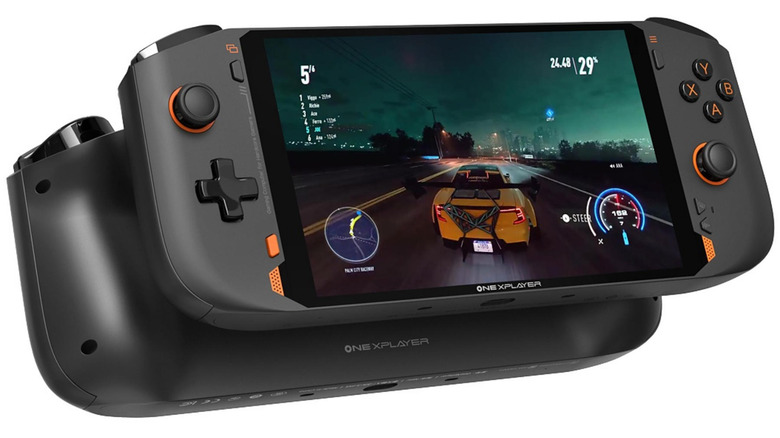
Although the Steam Deck became the hottest topic in PC gaming because of its Switch-like portable design, it was hardly the first to try its hand at a handheld console for PC gaming. The most recent wave of such computers started with the first GPD WIN in 2016 and the niche market has since been dominated by at least two Chinese brands. With the Steam Deck's launch and limited availability, the handheld PC market seems to have been re-ignited, with new models and designs that try to capitalize on gamers' newfound interest.
The Steam Deck, however, also started a new sub-current within that market, with new variants of old models bearing AMD's processors instead of Intel's. That's exactly what One Netbook is attempting to offer with a new variant of its OneXPlayer Mini, potentially cashing in on the popularity of the Steam Deck with an AMD-powered handheld of its own.
As its name suggests, the OneXPlayer Mini is actually a slightly smaller variant of the original model that launched in 2021 to preempt Valve's Steam Deck. Though it does have the same 7-inch display, the OneXPlayer Mini supports a higher 1920x1200 resolution. The handheld also comes with faster PCIe NVMe storage right off the bat instead of slower eMMC technology. With 16GB of RAM and a variety of ports, the OneXPlayer Mini is truly more like a mini-laptop than a watered-down PC.
Like many of its peers and rivals in this space, the OneXPlayer initially launched with Intel processors only. Since the Steam Deck, however, there has been a steady trickle of AMD variants that may give Intel a run for its money. This new OneXPlayer Mini, in particular, is arriving with an AMD Ryzen 7 5800U, which has eight cores and 16 threads, as well as Radeon Vega 8 graphics. For some, that alone makes this model a more worthwhile gaming computer.
A very different alternative to Steam Deck
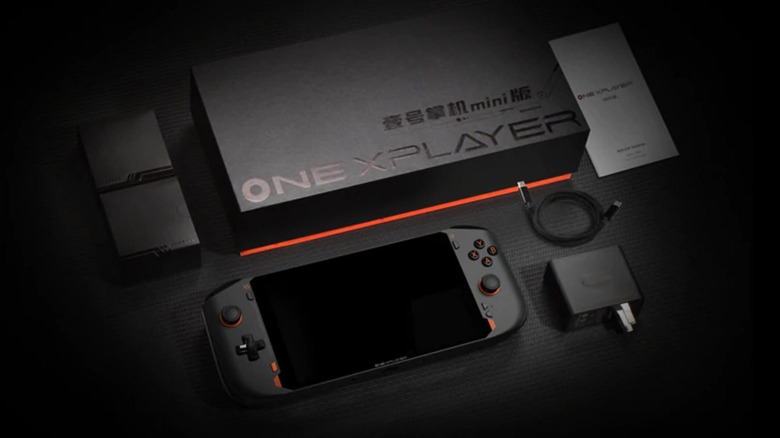
It's almost too easy to compare the OneXPlayer Mini with the Steam Deck in terms of design and that AMD CPU, but as they say, the devil is in the details. The OneXPlayer Mini uses an off-the-shelf AMD Ryzen and ships with Windows out of the box, making it really more comparable to Windows laptops. In contrast, the Steam Deck uses a custom AMD SoC and runs the Linux-based Steam OS, so the company is better able to fine-tune its performance.
The biggest deal-breaker for many, however, will likely be the price. While the Steam Deck costs, at most, $649, the OneXPlayer Mini starts at $999, which is actually a discounted pre-sale price from the full $1,259. One can easily buy a more powerful gaming laptop at that rate, but the handheld form factor does have the advantage of portability.
With delays and limits in the Steam Deck's availability, many PC gamers might be a bit tempted by these alternatives, especially when they come with Windows already pre-installed. Ironically, One Netbook is rumored to be considering developing its own Steam OS version in order to boost the popularity of its devices with Steam fans.
The Video Game Stories That Defined The Industry In 2021

It has been a heck of a year for the game industry. With the COVID-19 pandemic serving as the backdrop, we've had a lot of ups and downs this year. From the major revelations about Activision Blizzard to the ongoing semiconductor shortage that continues to impact manufacturing, 2021 was filled with big headlines. Here are some of the biggest stories that defined the year in gaming.
PS5 and Xbox Series X still thin on the ground
The pandemic's impact on manufacturing and global supply chains is perhaps nowhere more evident than in the world of gaming. More than a year out from the launch of the Xbox Series X and PlayStation 5, both consoles are still very difficult to find.
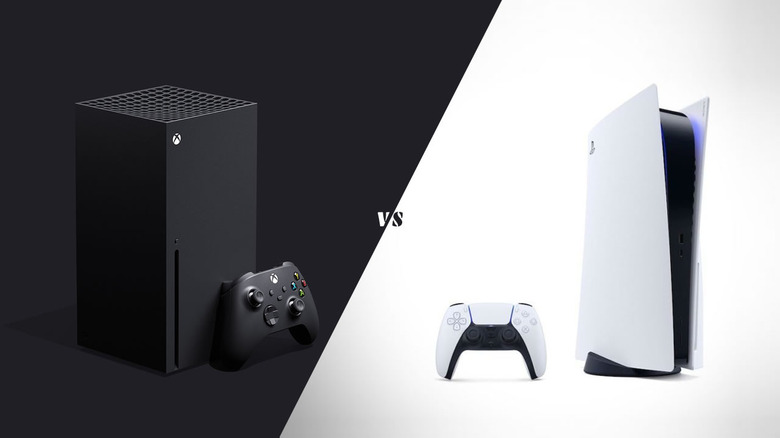
While the stock shortages may have eased somewhat as we moved throughout the year, it's hard to see evidence of that on store shelves. We have a worldwide semiconductor shortage to thank for these consoles being hard to find, and some in the industry are saying that we may be feeling the effects of this shortage for some time to come.
That isn't encouraging for those who want to upgrade to new hardware but have to contend with stock that sells out immediately because of high demand, robots that can check out faster than any human, and scalpers who view this shortage as a way to make a sleazy buck. Will consoles like the PS5 and Xbox Series X become easier to find at any point during 2022? We'll keep our fingers crossed, but after the last two years, we're not exactly hopeful.
Activision Blizzard makes a bad scandal worse
The debate about which major publisher is the worst remains contentious. Electronic Arts, Ubisoft, Activision Blizzard, and Take-Two are often at the top of the list, depending on who you ask, but if we had to pick the worst one for the year overall, it would undoubtedly be Activision Blizzard.
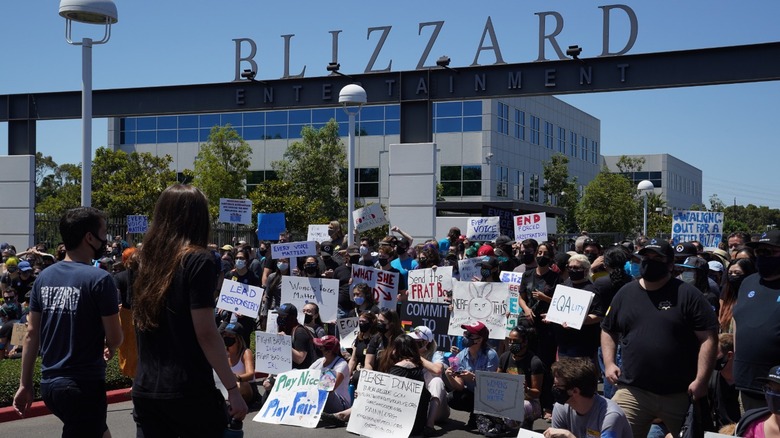 Bloomberg/Getty
Bloomberg/Getty
In July, Activision Blizzard was hit with a lawsuit from the California Department of Fair Employment and Housing [PDF] alleging that the publisher has allowed a culture of sexual harassment and abuse to fester for years. Ever since that lawsuit was made public, Activision has seemingly gone out of its way to act as cartoonishly evil as possible.
As if tone-deaf press releases and bog-standard corporate empty promises weren't enough, Activision Blizzard made things worse on numerous occasions. The DFEH has expanded its lawsuit to allege that the company interfered with its investigation, while a recent bombshell report from The Wall Street Journal alleged that Activision chief Bobby Kotick had known about these sexual misconduct allegations for years, at some points reportedly hiding those complaints and settlements from the Board of Directors. If you thought it couldn't get worse, the WSJ's report claims Kotick threatened to kill an assistant at one point.
It's hard to imagine how Activision Blizzard's Board could possibly justify keeping Bobby Kotick in his position after the year the company just had, but they'll probably find some shaky justification for it and then continue on acting like all is well.
The reveal of the Steam Deck impresses
Despite 2021's best efforts to stamp out fun and excitement, there were still some bright spots. Perhaps the biggest was Valve's reveal of the Steam Deck, a handheld PC gaming machine that looks like a grown-up Nintendo Switch.
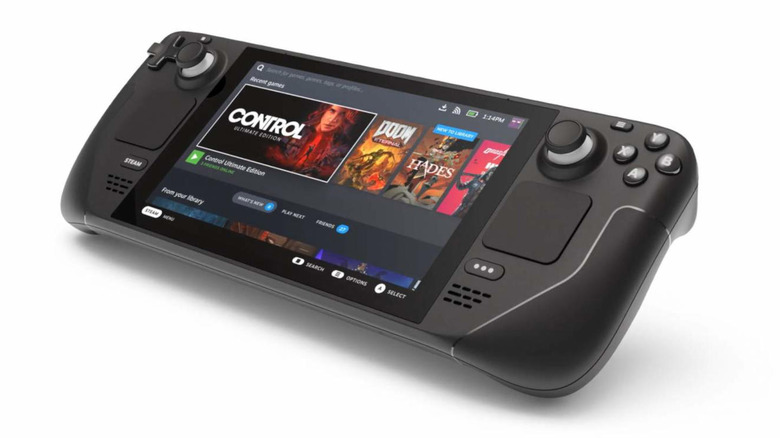 Valve
Valve
While we've yet to get our hands on a Steam Deck and try it for ourselves, the promise it makes is an appealing one: play your PC games on the go with a reasonably powerful handheld. While the Steam Deck obviously isn't going to match our gaming desktops and laptops in terms of power, the idea of truly portable PC games is more than enough to make us not care in the least.
Sadly, the COVID-19 pandemic forced Valve to delay the Steam Deck's launch by a couple of months, but assuming there are no more delays, we should get the chance to see if the Steam Deck really achieves the dream starting in February 2022. If the Steam Deck can deliver on its promise, it could very well change the way we play PC games.
Microsoft makes a big purchase
Microsoft kicked off 2021 with a bang, announcing in March that it had completed its purchase of ZeniMax Media and all of its subsidiaries. While ZeniMax might not be a household name, many of the studios under its umbrella are. With this acquisition – which set the company back an eye-watering $7.5 billion – Microsoft instantly turned the likes of Bethesda, id Software, Tango Gameworks, and Arkane Studios (among others) into Xbox Game Studios.
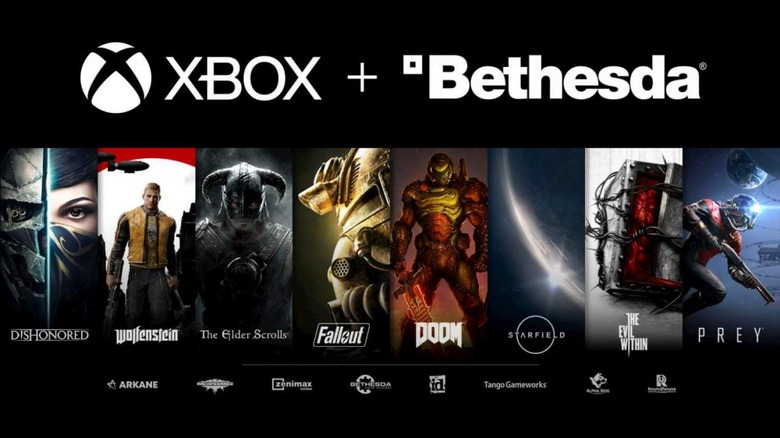 Xbox
Xbox
PlayStation dominated the last generation with its focus on pumping out stellar PS4 exclusives, but with the acquisition of ZeniMax, we saw Microsoft even the playing field in an instant. It wasn't long after the acquisition was completed that we saw many ZeniMax games come to Xbox Game Pass, from The Elder Scrolls and Fallout series to DOOM and Wolfenstein.
But Microsoft did not spend $7.5 billion just to bolster the Xbox Game Pass library (though that is a big perk). The company clearly plans to make Bethesda's big upcoming games exclusive to Xbox and PC, possibly tempting those PlayStation fans who also want to play The Elder Scrolls VI or future Fallout titles over to team Xbox. Whether or not those exclusive Bethesda titles will drive Xbox sales that otherwise may not have happened remains to be seen, but having big franchises like The Elder Scrolls and Fallout as exclusives certainly isn't going to hurt.
Sony goes shopping
Microsoft wasn't the only company to write some checks this year. Sony did the same thing, though it made smaller, much more focused acquisitions than Microsoft did. This year alone, Sony has acquired studios such as Housemarque, Nixxes Software, Firesprite, Fabrik Games, Bluepoint Games, and Valkyrie Entertainment.
 PlayStation
PlayStation
Some of these are obvious purchases. Housemarque, for instance, developed Returnal, one of the earliest PlayStation 5 exclusives out of the gate and a title that you'll no doubt see on a lot of year-end "Best of" lists. Meanwhile, Nixxes has been responsible for many of Sony's PC ports, suggesting that those will only continue in the future. Bluepoint, on the other hand, has made several enhanced remakes, including Shadow of the Colossus and Demon's Souls.
Perhaps the strangest of Sony's acquisitions this year was that of Evolution Championship Series, or Evo for short. Evo is one of the biggest – if not the biggest – fighting game tournaments of the year, so we see Sony dipping its hand into the world of esports here. Technically, Sony's acquisition of Evo is a joint venture with another esports company called Endeavor, so it doesn't have sole ownership over the tournament, but we're still excited to see how the event may change with Sony calling at least some of the shots.
This is not the Switch Pro you're looking for
It seems like ever since the Nintendo Switch first launched in 2017, there have been whispers and rumors about an upcoming Switch Pro. Of course, the rumored specifications of such a machine changed multiple times throughout the years, but essentially, it was said to be a more powerful version of the Switch. Often, those Switch Pro rumors were paired with talk of a handheld-only Switch Lite, so when that became a reality in 2019, many people expected the Switch Pro rumors to pan out the same way.
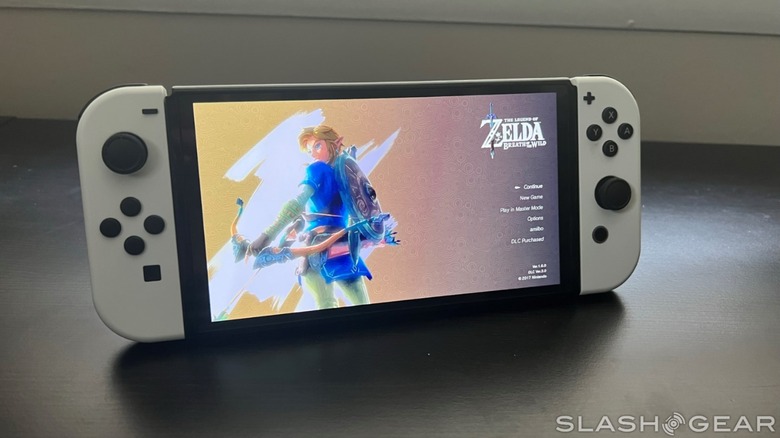
While 2021 did bring us a new Switch, what we got certainly wasn't the Switch Pro. Instead, Nintendo launched the Switch OLED, a console that only offers upgrades over the standard Switch in a few very specific areas.
As the name suggests, the Switch OLED has an OLED display that looks rather good. It also has a better kickstand, more internal storage, and a new dock, but it's functionally the same as the standard dock beyond an integrated LAN port. While we found that Switch OLED is the model to buy for those who are buying a Switch for the first time, it's not worth the upgrade for current Switch owners. After careful analysis, we determined that this definitely isn't the Switch Pro, so hopeful Switch owners will have to keep waiting.
Sora confirmed for Smash
The madmen actually did it. The last DLC fighter for Super Smash Bros. Ultimate was confirmed to be none other than Sora from the Kingdom Hearts series after years of what the fanbase figured was pie-in-the-sky dreaming.
Somehow, Nintendo worked it out with Disney and Square Enix, and the result was one heck of a send-off for the biggest Super Smash Bros. game ever created. Savor the feeling, Smash Bros. fans, because the lengths Nintendo almost certainly had to go to make this deal work practically ensures we'll never see a character reveal on this level again.
Billion-dollar company sues trillion-dollar company, nothing changes
Apple and Epic went at it in the courtroom this year, with Epic attempting to dodge the hefty 30% fee Apple takes on each iOS App Store transaction. Last year, Epic started advertising a direct payment method in the iOS version of Fortnite that would have sidestepped the App Store's payment systems, meaning Epic could keep that cut for itself.
Apple obviously didn't like that, so it removed Fortnite from the iOS App Store and took away Epic's development privileges. Epic was apparently waiting for this response and shot back with a lawsuit against Apple, alleging it was monopolistic with the iOS App Store's rules and asking to not only have Fortnite reinstated but also to compel Apple to allow developers to communicate about alternate payment methods in-app.
The lawsuit was decided primarily on Apple's favor earlier this year, but even the one win Epic got is on hold until the appeals process is over, so for now, not much has changed. Fortnite remains unavailable on iOS, but beyond that, it was just two companies with a ton of money bickering over fees in front of a judge.
Lucasfilm Games returns and the Star Wars license spreads
Shortly after 2021 began, Disney announced that it was reviving the Lucasfilm Games brand to act as the licensor of Lucasfilm properties for video games. That wasn't the big announcement – LucasArts had been licensing these properties for games since Disney's acquisition of Lucasfilm in 2012, so officially, this was only a name change and not much more.
What followed that name change were the big announcements. We learned that Machine Games will be creating an Indiana Jones title with Bethesda acting as publisher, while various studios are working on new Star Wars games. We know that Massive Entertainment is working on an open world title, while Quantic Dream has already teased its narrative-driven Star Wars game, and Aspyr has revealed its Knights of the Old Republic remake. When you consider that Respawn Entertainment is almost certainly working on a follow-up to Star Wars Jedi: Fallen Order, there's a lot to be excited about if you're a Star Wars fan.
There's plenty of reason to be excited to see Star Wars expand to other publishers and studios aside from Electronic Arts. Even though we've gotten past the loot box debacle that marred the launch of Star Wars Battlefront II years ago, it's great to hear that multiple studios are working on their own Star Wars universe titles. Perhaps these upcoming games can fill the void that remains following a certain underwhelming sequel trilogy? Here's hoping.
Wrap-Up
So, at the end of it all, 2021 was a year of some exciting highs, some shockingly low lows, and a lot in between. It certainly wasn't the most incredible year in the games industry, but after all of the delays we've seen in 2021, 2022 is looking like a particularly strong year. Hopefully, the global semiconductor shortage will ease next year so we can properly get moving on to the next generation and all that it entails.
Recommend
About Joyk
Aggregate valuable and interesting links.
Joyk means Joy of geeK